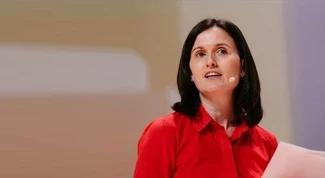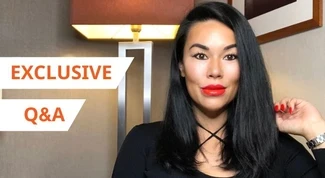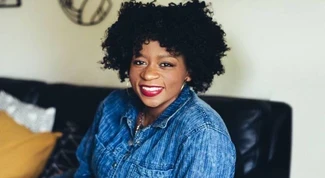Possessing unparalleled drive and determination, Sam Ruddock is an outstanding Paralympic athlete who has rocketed through the ranks of track cycling. Initially spotted as a potential track and field athlete, Sam was recognised for his speed and power whilst playing American Football at the University of Loughborough. Soon selected to compete in the 100m and 200m, Sam made his Paralympic debut at the London 2012 Olympic Games.
Described as ‘down to earth and extremely relatable’, Sam is a highly sought-after speaker with the gift of confidence and charisma. In this exclusive interview, Sam’s authenticity shines through as he shares how he stays mentally fit, his advice to those struggling in these tough times, and why diversity and inclusion are important to him.
Q: How do you stay motivated?
“It's been very difficult to motivate myself recently with the lockdown and the fact all competitions have been suspended or postponed.
“With no carrot on a stick of competition, it's been even harder to motivate myself to continue training. But I also am aware that other athletes around me, my competitors, will not be resting on their laurels either. I would hate to be in a situation where it's time to compete and I haven't kept myself as fit as I possibly can, despite being disrupted.
“Although there's no competition, I still want to be ready and so that is the motivation at the moment, making sure I don't get left behind because I don't want to be caught short when we go back to full training and competition.
“I want to stay ahead of the game so when next year rolls around, I’m in the best shape I can be to potentially win something shiny around the neck.”
Q: What advice would you give to others during this tough time?
“It would be stay in touch with people, friends, family, and talk to them as much as you need to.
“Also, make sure you take a break from what you're currently doing, whether that’s training, working, studying, give yourself that time to have a break.
“Take time to relate to people, to relax, and to reflect. Now is a really good time to start planning for the future whilst we have the time to do so. While you can’t do the things you normally would do, start to figure out what's going to happen when the next milestone in your life comes along, whether you’re moving onto a new job, if you're graduating, if you're on the cusp of going into a new sport if you're retiring - if there's a big change happening in your life, start planning for it.
“Start laying some foundation so you don't get caught short and educate yourself on where the world is going, and what's currently happening in the world like the digital transformation - it's almost like an industrial revolution has happened overnight this year. So much has changed.
Q: What advice would you give to young athletes during this time?
“My advice to young athletes in particular would be to have a greater awareness of the world in which you now live in. Think about yourself as a commodity, how do you market yourself, how do you sustain yourself and where are you going to fit when sport is finished?
“No matter what age you are, you have to think about what's going to happen when you retire because, it's sad to think about it, but eventually everyone has to retire because the body can't do anymore, so there has to be something there for you to go to when you hang your spikes up, your cleats up, your gloves or whatever it is you use.
“Don't be on your phone too much either. I see loads of athletes, especially young athletes, always on their phones. If you're on your phone all the time, how are you ever going to give yourself the time to think about what you're doing or what you've just done or what you just achieved? If you're overstimulating your brain, your mind and you're distracting yourself with a screen always in front of you, you're never giving yourself the time to do that.
“A really crucial part of growth is reflecting to recognise how to improve, and if you’re too busy looking through your Instagram, there's no time for reflection. When you're working and you're training, you really should be what I like to call ‘locked in’, focused on what you're doing.
I barely use my phone when I'm in the gym or when I'm training because it’s not important to me. What's important is the job I'm doing, and I want to be able to execute it the best of my ability.
“So my very last piece of advice; try to stay off your phone. If it's not necessary, don't touch it, leave it alone because you've got better things to do.”
Q: How do you stay mentally fit?
“I like to read - I'm a bit of a nerd. I like to do puzzles every now and then, I sound like an absolute grandad! I play Scrabble online with friends. I’m a self-confessed gamer, so my way of unwinding and relaxing is playing with the guys on Warzone and that's something I've done for years.
“Music is a really big part of my life. Music drives everything I do, there's not one point during my day where I'm not listening to music - the house is never silent, it's always on somewhere.
“Any mood you’re in music can help you. Whether you need to train hard in the gym or if you need to relax if it's just before bed. I don't scroll, I don't swipe, I don't do any of that stuff, I just listen to music and I find I sleep much better because I've taken that time to switch my brain off and tell my brain that it's time to sleep now. So, that's my way of staying relaxed, but also mentally sharp.
“Of course, the training that I do, getting out on the bike, is intrinsically linked to my mental health. As I’ve already said, if I did not have my training during lockdown, my mental health would have suffered considerably, and I would have almost questioned my day-to-day existence. I would’ve had no motivation at all, and the downward spiral would have begun.
“Physical activity and the serotonin, dopamine, and all that good stuff you get from just breaking a sweat, really helps you maintain good mental health. If you're not a fan of it, even just a brisk walk will seriously boost your mood. Just getting out and doing something that gets your heart going will make a huge difference to your wellbeing.”
Q: What specific physical and mental skills are necessary to thrive as a track cyclist?
“Strength! And strength combined with speed, which is power and endurance - a hell of a lot of endurance, whether that be aerobic capacity or anaerobic capacity.
“In the sprint events, it's very much a question of who can hold themselves in the pain cave the longest. It’s not always the quickest guy that wins, it’s the guy that can sustain the pain for the longest.
“I would challenge anybody who thinks they're pretty well conditioned to do a kilo, which is the event I do that I would’ve done at the Paralympic Games, and the event I do at the World Championships.
“So, it's four laps of the velodrome and the last lap of a kilo is probably one of the most horrendous things you will ever experience. You need to have your mind in the right place to do that and finish the race because if you're not, your legs will just stop turning and you’ll give up.
“To be a men's track cyclist you have to be very, very disciplined with the training. You have to be very prepared. If you're prepared to essentially hurt yourself in training, then you’ll have that mental fortitude, strength and resilience to keep pushing when it does hurt in competition. It will feel like a breeze because you've already done the hard work in training.
“You have to be very resilient, not just to pain, but to challenges. You have to be able to adapt and overcome challenges and see them as something that can be solved because there's always an answer. There's always a way forward. See a challenge as an opportunity.
“Also remember you don't have to do it on your own. I have a really valuable team working in my corner including coaches, mentors, family, friends. A lot of what I've learned and a lot of the skills I have, I've learned from others. You have to be a sponge, soak everything up, every piece of advice, every piece of help that you've been given. We’re all the product of the time and effort someone else has given us.
“When you are training and competing, you’re not only thinking about yourself, but you’re also thinking about all the time and effort that someone spent on you to get you to this point. So you're not just doing it for yourself, you're also doing it for them, and that can give you the edge when the chips are down and it's time to get down to business.”
Q: Why is teamwork important and what constitutes a successful team?
“Teamwork is crucial. Everybody has to be on the same page. And if you're not on the same page, figure out why and how to arrive at the same destination. Everyone has to be prepared to compromise and everyone has to make allowances.
“In individual sports, great teamwork can really give you the edge. It's not just me, it's ‘us’. We are working together to achieve this goal, and ‘we’ is a lot stronger than ‘I’ – it’s much more powerful.
“I have to put the final piece of the puzzle in, yes, but everybody else has to create the puzzle in the first place so I can just slot in there.
“Everybody has to work together towards a common goal, and everybody has to buy into it as well. There should be no misunderstandings, everybody from the outset has to understand the reason why we're doing something, because if we don't understand the reasons why, then it makes it very difficult to stay motivated and to keep going.
“Everybody has to buy into the same ethos. It’s the same in business, teams need a strong ethos, and they also need to be prepared to meet challenges with compromise so they can work together.”
Q: What qualities make a good leader?
“A strong leader to me is someone that always asks, ‘how are you doing?’. Like, not you the employee, not you, the athlete, but how are you as a human being - how are you feeling?
“Because that will always dictate how that person will perform on that day. If they don't perform well, often the reason is because something personal is happening behind the scenes and you need to understand why or at least make allowances.
“So, I think a particularly strong leader that people gravitate to is someone that acknowledges there is a human being behind the number and is also someone who leads by example. They're prepared to get their hands dirty for the team, as an equal part of the team”
Q: What does diversity and inclusion mean to you, and why are they important?
“Everybody deserves a fair shot, and everybody deserves their chance.
“Regarding disability and sport, everybody is the same. Yes, there are differences and of course coaches make adaptations to training programs and what they ask of athletes depending on the athlete’s ability, but to me there's no such thing as a disability - everybody is just abled differently, based on what you can and can't do.
“One of the best things that the Paralympic Games ever did, especially the London 2012 Games, was help people focus on what a person with an impairment can actually achieve, opposed to what they can't do.
“In terms of inclusivity, everybody deserves the chance to show what they've got, and everybody should be made to feel welcome because we all deserve that.”
Q: If you could give yourself one piece of advice at the start of your career, what would it be?
“My advice would be to try everything once and always give everything 100%.
“I would say just keep going, keep working hard and always do the best you can because that's all anybody can ever ask of you.”
Hire Sam Ruddock
Contact the Champions Speakers agency to provisionally enquire about Sam Ruddock for your event today. Simply call a booking agent on 0207 1010 553 or email us at [email protected] for more information.









